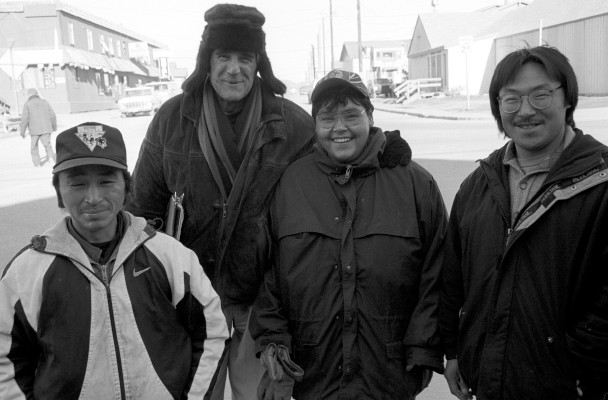An interview by Raphaël Brun with Jan Borm, Vice-President in charge of international relations at the University of Versailles Saint-Quentin-en-Yvelines (UVSQ) and director of MIARC about Jean Malaurie's personal itinerary and scientific career as well as his legacy to research in the future has been published in Monaco Hebdo, March 12, 2024.
Jan Borm relates his first meeting with Jean Malaurie in the early 2000s and explains the latter’s passion for the Far North.
The interview focuses on Malaurie’s family origins in Normandy and Scotland, his refusal to enroll in the Mandatory Work Service (Service du Travail Obligatoire, STO) imposed by the Nazi occupant to young Frenchmen of his generation which forced him to go into hiding, joining the French Résistance movement. His resolute anti-conformism in intellectual terms is also highlighted, Malaurie, as a trained geomorphologist, having always been skeptical about theoretical approaches, such as structuralism, that are not based on thick description. Instead, having turned to anthropogeography after his initial studies of fallen rock dynamics in hot and cold climates (Hoggar Mountains in Algeria and North-West Greenland in the late 1940s, early 50s), he championed narrative ethnography and life stories, one of the hallmarks of the prestigious “Terre Humaine” book series he founded at Plon Publishers in 1955 with his own classic account The Last Kings of Thule, the most widely distributed book in the world about Greenland with its 20 translations, and Claude Lévi-Strauss’ seminal Tristes Tropiques which inspired generations of social scientists to come. Indeed, his training as a scientist made him weary of studies based on sketchy observation and hasty generalizations behind which authors would screen themselves and that allow little insight into the potential risks of misinterpretation due, notably, to language and translation issues, but also cultural and social à priori. He was one of the few scholars in the French Humanities in the 1950s and 60s to take a keen interest in the worldview of First Nations and what he called their vertical thought, at a moment when Marxism was mainstream and religion only to be studied as far as material culture is concerned. In the interview, Jan Borm also discusses the origins of Jean Malaurie’s project of donating his Arctic collections to the Oceanographic Institute/Prince Albert 1st of Monaco Foundation in 2022, inspired by his longstanding contacts with Prince Albert II.
Asked about Jean Malaurie’s legacy, this is how Jan Borm sums and comments Malaurie’s impressive achievements:
“Jean Malaurie has left us an immense body of work. His work is of great interest. He met peoples who no longer exist. He saw living conditions that no longer exist either. He was an extraordinary witness to his time. He was a convinced humanist. He always worked for what he called ‘cultural diversity’, observing that ‘cultural diversity is as necessary as biodiversity. Otherwise, we won't be able to survive.’ He's absolutely right. We must work to ensure that as many languages and cultures as possible continue to exist. Humanity needs them. He also saw indigenous peoples as sentinels of what we should do in the future, because we can't go on like this. We can see this clearly with climate change, which Jean Malaurie saw very early on. The life of indigenous people in their environment can show us the way forward. There's a very important message here.”

© Bruce Jackson

